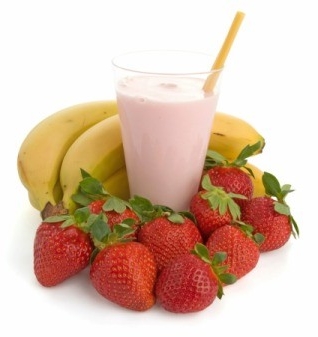WC '16 Finals S2 - Rational Recipes
View as PDF2016-17 Woburn Challenge Finals Round - Senior Division

The worst has come to pass, with the war between the monkeys and cows now officially in full swing. In fact, the first major battle has been scheduled for next week! As an experienced military leader, the Head Monkey is well aware of the importance of an often under-appreciated aspect of war – the nutritional well-being of the soldiers. She's taken it upon herself to personally prepare the upcoming battle's rations.
The Head Monkey has
different types of fruit
ingredients to work with, numbered from
to
. Fruit type
corresponds to the monkeys' beloved bananas, of course, while the other
fruit types are less tasty but have their own nutritional benefits.
There are
fruits of the
-th
type available.
The Head Monkey intends to come up with a smoothie recipe, which will
call for combining a certain set of fruits together to create a single
smoothie. The recipe will dictate that exactly
fruits of
type
must go into the smoothie, where
is a strictly positive
integer for each
between
and
. It's unclear exactly what recipe
she'll come up with, though – we can only hope that it will be edible,
for the monkeys' sake.
It's also unclear how many monkeys will actually be participating in the upcoming battle, though the number of monkeys will surely be some positive integer. However, it's imperative that each of them receive a single smoothie, with all of the smoothies having been created using the same recipe as one another.
Of course, the number of available fruits is a serious limiting factor.
If there are monkeys, and some recipe
is chosen, then
fruits of each type
will be required in total, and this
quantity cannot exceed
. However, there's an additional
restriction – due to the high value placed on bananas, it's important
that there be no leftover bananas, as they'd go to waste. Therefore, it
must be the case that
.
The Head Monkey has lots of great recipes in mind, but she's willing to
accept that some of them might not work out in terms of producing a
valid set of smoothies for or more monkeys. That being said, she's
wondering exactly how many different possible recipes she could validly
choose. This quantity may be quite large, so she's only interested in
its value when taken modulo
.
As a hint, the following properties of modular arithmetic may be useful:
In test cases worth of the points,
and
for each
.
In test cases worth another of the points,
for each
.
In test cases worth another of the points,
for each
.
Input Specification
The first line of input consists of a single integer .
The second line of input consists of space-separated integers
.
Output Specification
Output one line consisting of a single integer – the number of different
possible recipes which might be used (modulo ).
Sample Input
3
4 2 4Sample Output
10Sample Explanation
possible recipes are as follows:
(serving
monkey)
(serving
monkey)
(serving
monkeys)
There are other possible recipes.
Comments